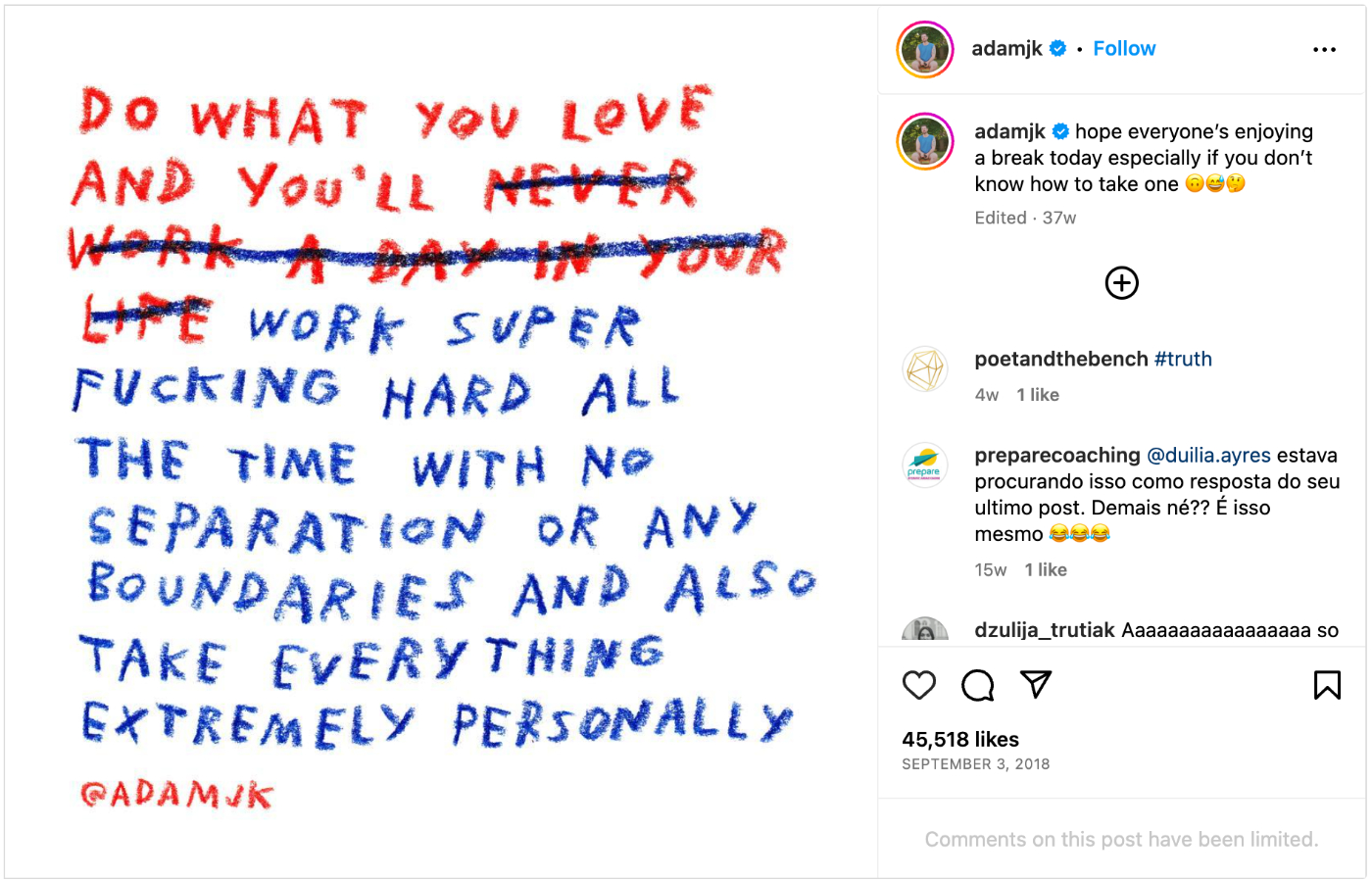
When I quit my corporate job, I thought everything about my life would change.
I was in my early thirties and had been working for the man since college. For years, I had fantasized about the day when I could finally be my own boss and never attend another meeting that should have been an email. I was excited to no longer have a manager.
Then, I started working for myself and learned that I was the worst manager I’d ever had.
I thought my drive to always be available, work on weekends, and emoji every Slack message resulted from the culture of the companies I worked for. It was a rude awakening when I learned that my tendency to overwork persisted even without a boss. It’s me, hi, I’m the problem, it’s me.
I felt great when I crossed an adequate number of items off my to-do list and like crap when I didn’t. I had a hard time clocking out, even though I was the only one setting the schedule. I celebrated each of my wins, which felt great until I remembered that I was responsible for all of my losses as well.
A couple of years later, I’m still working for myself. I’ve gotten better at setting boundaries and separating my self-worth from my output. But I’ve learned that there are many great aspects of having a job that get overshadowed by the romanticization of self-employment.
Freeing yourself from the shackles of W-2 employment is not the only path to happiness in the digital economy, despite what the lifestyle influencers and Instagram reels might say. In an age where we revere the work-from-anywhere freelancers and the surf-at-noon small business owners, here are some reasons why having a full-time job can actually be… good.
Teams scale your impact
As much as we love to idealize the rugged individualism of independent workers—the solopreneur, the 10x engineer, the prolific writer—there are limits to any one person’s skills, hours, and perspective. Talented teams almost always accomplish more than talented individuals. Not only does collaboration make the work better, it often makes it more fun.
Ask any member of a highly functioning team—from the ’97 Bulls to the ’67 Beatles—and they’ll tell you how being part of a team raised their ambition. “My model for business is The Beatles,” Steve Jobs famously said. “They were four guys who kept each other's negative tendencies in check. They balanced each other and the total was greater than the sum of the parts.”
As Every columnist Michael Ashcroft points out, knowing that your work is an important part of a larger system can also be a great source of motivation. Your responsibility to your coworkers can inspire you on days when intrinsic motivation isn’t flowing naturally.
Jobs provide useful constraints
When you work for yourself, there’s an immense amount of what I like to call “work about the work.” You are your own salesman, HR representative, and accountant (or at least assistant accountant).
While many people start working for themselves so they can do more of what they love, many solopreneurs and small business owners end up doing a lot more administrative work than when they were employed by someone else. The hours filing quarterly tax estimates and waiting on hold with insurance companies are rarely included in the LinkedIn posts about being your own boss.
This leakiness isn’t limited to administrative tasks. Jobs, despite their politics and bureaucracy, provide useful constraints on what to work on. Roles within an organization are clearly defined, and managers are paid to help prioritize your tasks. For independent workers, figuring out what to work on can be a job in itself.
Stability de-risks experimentation
As someone who writes about careers, I often get asked: “How do I know when it’s time to quit my job?” It’s a fair question—and not something that I can answer. But I try to remind people that quitting is not the only way to pursue a more values-aligned path.
There are ways to craft the job you currently have to be more like the job you want. You can experiment with different potential paths (for example, starting a side project or taking a class) without relying on them to pay your rent. In fact, the security of full-time work can make figuring out your next step easier.
I love famous examples of artists who had day jobs—Oscar Wilde, the plumber, and William Carlos Williams, the physician—because they show how financial security can fuel rather than hinder creative expression. Certainly, some people align their work with their personal interests and values, but others do what they have to so they can do what they love outside of work, which is no less noble.
Jobs enable us to pay for our lives
Online, people often parade their professional accomplishments for others to see, and there can be pressure to have our jobs reflect our identities, personalities, and values. But it’s important to remember that the fundamental purpose of a job is to pay for our material existence. Getting a fixed amount of money in your bank account every two weeks—not to mention paid time off and healthcare—is easy to take for granted.
Yes, jobs require you to give up some of your time, labor, and autonomy. For some, this cost isn’t worth it. But for the vast majority of people, it’s a worthwhile exchange. A job can be a vehicle for changing the world or deriving fulfillment, but many people do not work to self-actualize; they work to survive. Although we love to romanticize those who have found a way to escape the rat race, there’s nothing wrong with having a 9-to-5.
Simone Stolzoff is a San Francisco-based writer and designer. He is the author of the book The Good Enough Job: Reclaiming Life from Work. If you liked this piece, you can subscribe to his free newsletter. The fall cohort of his course, Designing Your Next Career Step, just opened for enrollment—get 15% off with the code EVERY.
Find Out What
Comes Next in Tech.
Start your free trial.
New ideas to help you build the future—in your inbox, every day. Trusted by over 75,000 readers.
SubscribeAlready have an account? Sign in
What's included?
-
Unlimited access to our daily essays by Dan Shipper, Evan Armstrong, and a roster of the best tech writers on the internet
-
Full access to an archive of hundreds of in-depth articles
-
-
Priority access and subscriber-only discounts to courses, events, and more
-
Ad-free experience
-
Access to our Discord community

Comments
Don't have an account? Sign up!
Romanticizing the side hustle is a veneer over despair. A lot of people recognize that full-time jobs that provide a modicum of steady income, some constraints on one's schedule, and a limited scope of work are worth some trade-offs in autonomy.
However, what people are dealing with are jobs with job descriptions they don't want in the first place, that don't pay enough money, "other duties not assigned," toxic companies, and no security.
@bsaunders_2028 good point.
I mostly agree with the logic in the post if you are simply considering the impact of your job on your individual life and experience - but the reality is that a person's work doesn't exist in a vacuum.
From the article: "A job can be a vehicle for changing the world or deriving fulfillment, but many people do not work to self-actualize; they work to survive."
Considering the impact of one's work on society is not simply a matter of personal fulfillment and self-actualization. It can also be a matter of ethics. It can come from a place of understanding that companies differ in the way they distribute earnings, manage their environmental impact, contract exploitative labor, coerce consumers, lobby for policy change...etc. A job is one of the greatest influences a person can have on society, as they may be spending 8+ hours per day offering one of their greatest assets - their mind - to drive success for their employer. A person's work can amplify the proliferation of certain values, ideas, and the influence their employer has on society. For some, choice of employer is not an option, and they must accept the ONLY available job to survive. That does not appear to be the target audience of this article, as it is offering a perspective on career selection - which implies the reader may have agency in their career path. Otherwise, what use does this article have for someone without agency.
That said, I think it is totally a personal values judgement whether a person with the privilege of career choice cares to consider the broader societal implication of their choice - though whether a person chooses to consider it or not doesn't change the fact that their decision to choose a job simply for lifestyle reasons may directly or indirectly affect another community's ability to merely survive. If I were trying to offer a perspective on career choice, given my personal values, I would want my audience to consider this reality into their calculus.
Essentially, I see this article as representing a more individualistic perspective, and the advice feels logically sound from THAT perspective. But I also believe a collectivist attitude on career decision-making among people with the privilege of choice has the potential to lead to improved collective wellbeing - and as someone that values collective wellbeing, that's a perspective I'd personally want to spread.